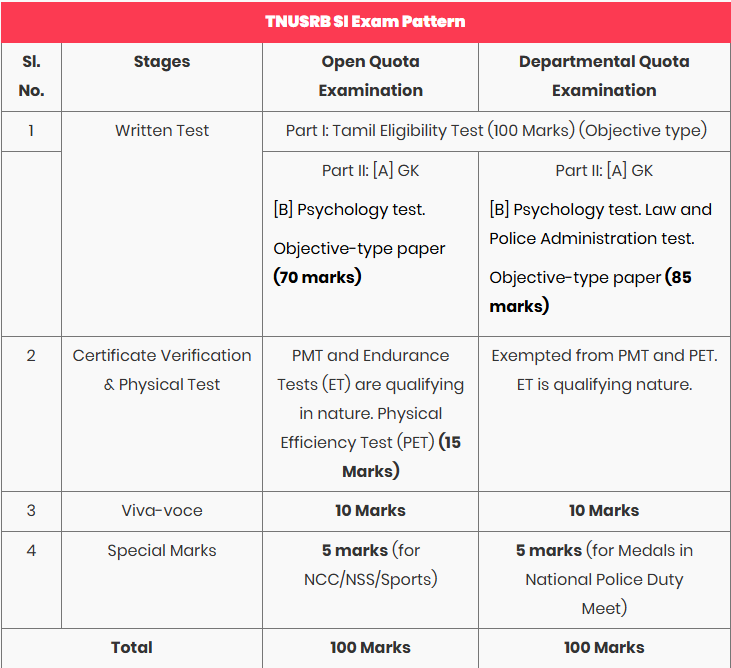TNUSRB Syllabus
TNUSRB Syllabus 2025 and Exam Pattern 2025
The TNUSRB exam is conducted to recruit candidates for Tamil Nadu Police, Fire and Rescue Services, and Jail Department. This page provides the complete TNUSRB Syllabus 2025 , including updated subject-wise topics and exam pattern for Constable, SI, and Fireman posts. At Kanchi Valluvan IAS Academy, we help aspirants stay exam-ready with a clear and structured syllabus guide.

Selection Procedure
The selection process for the TNUSRB Sub-Inspectors (SI) recruitment is divided into several stages. Each stage must be cleared to advance to the next. The stages are as follows:
- Written Examination (Part I: Tamil Language Eligibility Test)
- Written Examination (Part II: Main Written Examination)
- Physical Measurement Test (PMT)
- Endurance Test (ET)
- Physical Efficiency Test (PET)
- Certificate Verification & Viva-Voce
Written Examination - TNUSRB Syllabus 2025
Part I: Tamil Language Eligibility Test
The Tamil Language Eligibility Test is the first step in the written examination process. Candidates must secure a minimum of 40 marks (40%) to be eligible for the evaluation of their main examination OMR answer sheet. For departmental candidates, this test is conducted commonly along with those applying for the open quota. Departmental candidates who have applied under both Open and Departmental categories need to write this test only once.
Part II: Main Written Examination
The Main Written Examination is critical and candidates must achieve the minimum qualifying marks to proceed to the next stages of the recruitment process. The minimum qualifying marks are 25 for open candidates and 30 for departmental candidates. However, the number of candidates called for the subsequent stages will be in a specific ratio based on the vacancies. For Certificate Verification, PMT, ET, and PET, the ratio is 1:5 of the vacancies, and for Viva-Voce, the ratio is 1:2 of the vacancies.
Exam Pattern
The written examination is designed to assess a candidate’s knowledge and skills in various areas. Below is a detailed breakdown of the exam pattern:
Part I: Tamil Language Eligibility Test
Objective Type Questions
Duration: 1 Hour
Total Marks: 100
Minimum Qualifying Marks: 40
Part II: Main Written Examination
Objective Type Questions
Duration: 2 Hours 30 Minutes
Total Marks: 85
Minimum Qualifying Marks: 25 for Open Candidates, 30 for Departmental Candidates
TNUSRB Syllabus 2025
Tamil Language Eligibility Test
The syllabus for the Tamil Language Eligibility Test includes basic language skills and comprehension. The focus is on assessing the candidate’s proficiency in Tamil, including grammar, vocabulary, and comprehension abilities.
Main Written Examination
The Main Written Examination covers a wide range of topics. Here is the detailed syllabus:
General Knowledge
General Science
- Nature of Universe
- Measurement of Physical Quantities
- General Scientific Laws in Motion
- Force, Pressure, and Energy
- Everyday Applications of Mechanics, Electricity, Magnetism, Light, Sound, Heat, and Nuclear Physics
- Elements and Compounds, Acids, Bases, Salts, Petroleum Products, Fertilizers, Pesticides, Metallurgy, and Food Adulterants
- Main Concepts of Life Science, Classification of Living Organisms, Evolution, Genetics, Physiology, Nutrition, Health, and Hygiene, Human Diseases
- Environmental Science
Current Events
- Latest Diary of Events
- National Symbols
- Profile of States
- Eminent Personalities and Places in News
- Sports
- Books and Authors
- Welfare Schemes of Government
- Political Parties and Political System in Tamil Nadu and India
- Latest Inventions in Science and Technology
- Geographical Landmarks
- Current Socio-Economic Issues
Geography
- Earth Location
- Physical Features
- Monsoon, Rainfall, Weather, and Climate
- Water Resources, Rivers, Soil, Minerals, and Natural Resources
- Forest and Wildlife
- Agriculture Pattern
- Transport and Communication
- Population Density and Distribution in Tamil Nadu and India
- Calamities and Disaster Management
- Environment and Climate Change
History and Culture of India
- Indus Valley Civilization
- Guptas, Delhi Sultans, Mughals, and Marathas
- South Indian History
- Characteristics of Indian Culture, Unity in Diversity, Race, Language, Custom
- India as a Secular State
Indian Polity
- Constitution of India
- Preamble to the Constitution
- Salient Features of the Constitution
- Union, State, and Union Territory
- Citizenship, Fundamental Rights, Fundamental Duties, Directive Principles of State Policy
- Union Executive, Union Legislature, State Executive, State Legislature, Local Governments, Panchayat Raj
- Spirit of Federalism: Centre-State Relationships
- Election
- Judiciary in India
- Rule of Law
- Corruption in Public Life, Anti-Corruption Measures, Lokpal and Lokayukta, Right to Information, Empowerment of Women, Consumer Protection Forums, Human Rights Charter
Indian Economy
- Nature of Indian Economy
- Five Year Plan Models
- Planning Commission and Niti Ayog
- Sources of Revenue
- Reserve Bank of India
- Finance Commission
- Resource Sharing between Union and State Governments
- Goods and Services Tax
- Economic Trends
- Employment Generation
- Land Reforms and Agriculture
- Application of Science and Technology in Agriculture
- Industrial Growth
- Rural Welfare Oriented Programmes
- Social Problems: Population, Education, Health, Employment, Poverty
Indian National Movement
- National Renaissance
- Early Uprising against British Rule
- Indian National Congress
- Emergence of Leaders: B.R. Ambedkar, Bhagat Singh, Bharathiar, V.O. Chidambaranar, Thanthai Periyar, Jawaharlal Nehru, Rabindranath Tagore, Kamarajar, Mahatma Gandhi, Maulana Abul Kalam Azad, Rajaji, Subhash Chandra Bose, Muthulaksmi Ammaiyar, Muvalur Ramamirtham, and Other National Leaders
- Different Modes of Agitation in Tamil Nadu and Movements
History, Culture, Heritage, and Socio-Political Movements of Tamil Nadu
- History of Tamil Society, Related Archaeological Discoveries, Tamil Literature from Sangam Age till Contemporary Times
- Thirukkural: Significance as a Secular Literature, Relevance to Everyday Life, Impact on Humanity, Universal Values, Socio-Political-Economic Affairs, Philosophical Content
- Role of Tamil Nadu in Freedom Struggle
- Early Agitations against British Rule
- Role of Women in Freedom Struggle
- Various Social Reformers, Social Reform Movements, and Social Transformation of Tamil Nadu
Development Administration in Tamil Nadu
- Social Justice and Social Harmony as the Cornerstones of Socio-Economic Development
- Education and Health Systems in Tamil Nadu
- Geography of Tamil Nadu and its Impact on Economic Growth
Aptitude & Mental Ability Tests
- Simplification
- Percentage
- Highest Common Factor (HCF)
- Lowest Common Multiple (LCM)
- Ratio and Proportion
- Simple Interest
- Compound Interest
- Area
- Volume
- Time and Work
- Logical Reasoning
- Puzzles
- Dice
- Visual Reasoning
- Alpha Numeric Reasoning
- Number Series
TNUSRB SI Exam Pattern 2025
The exam pattern details are given here. • The TNUSRB SI written exam includes Part I (Tamil Eligibility Test), where candidates must score at least 40% to qualify for Part II (Main Exam). Minimum qualifying marks in the Main Exam are 25 for Open and 30 for Departmental candidates.


Physical Measurement Test (PMT) : Candidates who clear the written examination will proceed to the Physical Measurement Test. This test ensures that candidates meet the required physical standards for the role of Sub-Inspector.

Endurance Test (ET) : The Endurance Test assesses the physical stamina and endurance of candidates through various physical activities.

Physical Efficiency Test (PET) : The Physical Efficiency Test evaluates the physical fitness and efficiency of candidates through a series of physical tasks.

Certificate Verification & Viva-Voce : The final stage involves certificate verification and a Viva-Voce interview. Candidates’ documents and credentials will be verified, and they will undergo a personal interview to assess their suitability for the role.
Prepare with KV IAS Academy, The best IAS academy in Chennai, and excel in your TNUSRB SI Examination 2024. Our expert guidance and comprehensive resources will equip you with the knowledge and skills needed to succeed in each stage of the selection process. Join us and take the first step towards a rewarding career in the Tamil Nadu Uniformed Services.